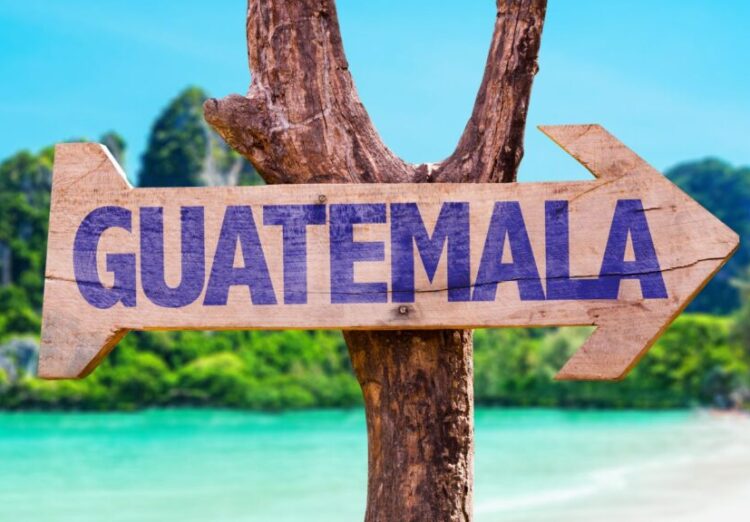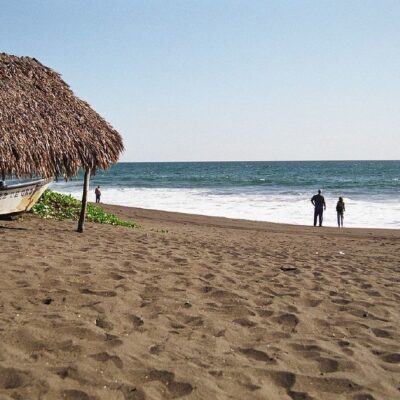When to come
The tourist high season runs December through March, coinciding with the winter months in most northern countries. It also coincides with Guatemala’s dry season. Throughout this season, and especially around the Christmas and Easter holidays, hotels can be booked solid well in advance, so be sure to have a reservation, especially in the more popular tourist spots. Easter and Holy Week are major holidays in Guatemala and in Antigua specifically. Hotels in Antigua are booked solid as much as a year in advance.
In general, the best time of year to visit weather-wise is in December and January, when everything is still green from the rains, but the sky is clear. If you want to avoid the crowds, I recommend traveling during “shoulder” periods, near the end or beginning of the rainy season, when the weather is still pretty good.

Getting here
By Plane
Most international flights land at La Aurora International Airport (tel. 502/2332-6086; airport code GUA). A few international and regional airlines fly directly into Flores Airport (FRS) near Tikal. If you’re only interested in visiting the Maya ruins at Tikal and touring the Petén, this is a good option. However, most visitors will want to fly in and out of Guatemala City.
It takes between 3 and 8 hours to fly to Guatemala from most U.S. cities.
The Major Airlines — From North America — American Airlines, Continental, Delta, Grupo Taca, Iberia, Mexicana, Spirit, and United all have regular flights from a variety of North American hub cities. Presently, there are no direct flights from Canada to Guatemala, so Canadians will have to take a connecting flight via the United States.
By Bus
Guatemala is connected to Mexico, Belize, El Salvador, and Honduras by regular bus service. If at all possible, it’s worth the splurge for a deluxe or express bus. In terms of travel time and convenience, it’s always better to get a direct bus rather than one that stops along the way — and you’ve got a better chance of getting a working restroom in a direct/express or deluxe bus. Some even have television sets showing video movies.
By Car
It’s possible to travel to Guatemala by car, but it can be difficult. The drive from the United States involves crossing the entire country of Mexico from north to south. Driving can be problematic for a variety of reasons, including bad roads, limited services, crime, corrupt border crossings, and visa formalities. If you do decide to undertake this adventure, take the Gulf Coast route from the border crossing at Brownsville, Texas, because it involves traveling the fewest miles through Mexico.
You will need a current driver’s license, as well as your vehicle’s registration and the original title (no photocopies), to enter Guatemala.
Tips for travelers
Accomodations
With the exception of a few large business-class hotels clustered in Guatemala City’s Zona Viva, Guatemala has no truly large-scale resorts or hotels. What the country does have is a wealth of intimate and interesting small-to-midsize hotels and resorts. Most of these are quite comfortable and very reasonably priced by most international standards. A few very classy luxury boutique hotels are scattered around the country, and are found with relative abundance in Antigua and around Lake Atitlán. Real budget travelers will find a glut of very acceptable and very inexpensive options all across the country. Warning: Budget-oriented lodgings often feature shared bathrooms and either cold-water showers or showers heated by electrical heat-coil units mounted at the shower head.
Dining
Guatemalans tend to eat three meals a day, in similar fashion and hours to North Americans. Breakfast is usually served between 6:30am and 9am; lunch between noon and 2pm; and dinner between 6 and 10pm. Most meals and dining experiences are quite informal. In fact, there are only a few restaurants in the entire country that could be considered semi-formal, and none require a jacket or tie, although you could certainly wear them.
I have separated restaurant listings throughout this guide into three price categories based on the average cost per person of a meal, including tax and service charge. The categories are Expensive, more than Q150 ($20/£10); Moderate, Q75 to Q150 ($10-$20/£5-£10); and Inexpensive, less than Q75 ($10/£5). Keep in mind that the 12% IVA tax added onto all bills is not a service charge. A tip of at least 10% is expected. If the service was particularly good and attentive, you should probably leave a little extra.
Women Travelers
For lack of better phrasing, Guatemala is a typically “macho” Latin American nation. Misogyny and violence against women, while not rampant, are part of the social fabric. Women should be careful walking alone at night throughout the country.
Staying Connected
Guatemala has a modern and extensive telephone network reaching most of the country. Most hotels will let you make international calls; however, their phone charges tend to be high so I recommend getting a calling card.
If your cellphone is on a GSM system, and you have a world-capable multiband phone such as many Sony Ericsson, Motorola, or Samsung models, you can make and receive calls across civilized areas around much of the globe, from Andorra to Uganda. Just call your wireless operator and ask for “international roaming” to be activated on your account. Be sure to ask them what the per-minute charges will be for Guatemala.
In Guatemala, there are several competing cellphone companies and networks. The main companies are Claro (tel. 502/2420-1414; www.claro.com.gt), which is a division of Telgua, the national telephone company; Movistar (tel. 502/2379-1960; www.movistar.com.gt), a division of the international firm Telefonica; and Tigo (tel. 502/2428-0000; www.tigo.com.gt). All of these companies sell prepaid GSM chips that can be used in any unlocked tri-band GSM cellphone. Most companies charge around a Q50 ($6.65/£3.35) activation fee, and this usually includes a few quetzales worth of talk time. All have numerous outlets across the country, in most major cities and tourist destinations, including La Aurora International Airport.
Calendare of Events
January
El Cristo Negro, Esquipulas. Pilgrims from across the world converge on the Basilica in this small city in El Oriente to pay their respects to the statue, the Black Christ. January 15.
April
Holy Week. Religious processions are held in cities and towns throughout the country. Colorful carpets line the streets of Antigua in preparation for the processions, while in Quetzaltenango there’s a live reenactment of the Passion and Crucifixion of Christ. Week before Easter.
July
La Fiesta Nacional Indígena de Guatemala, Cobán. This is one of Mesoamerica’s greatest celebrations of Maya culture. The city of Cobán features a steady stream of street fairs, concerts, parades, and parties. This is celebrated for 2 solid weeks in late July, sometimes extending into early August.
August
Fiesta de la Virgen de la Asunción, celebrated countrywide. The Virgin of the Assumption is the patron saint of Guatemala City and, by extension, the entire nation. There are celebrations, parades, and small fairs across the country, but the largest celebrations are held in Guatemala City. August 15.
September
Guatemala’s Independence Day, celebrated all over the country. This is a national holiday. Major cities and most towns and villages have parades and public concerts. September 15.
November
Día de los Muertos (All Saints’ Day), celebrated countrywide. The most famous celebration is the “drunken horse race” in the mountain town of Todos Santos. Guatemalans also fly giant, colorful kites to communicate with the dead in the village of Santiago Sacatepéquez. In the rest of the country, the celebrations may not be as elaborate or ritualized as in Mexico, but most Guatemalans take some time this day to remember the dead with flowers and trips to the cemeteries. November 1.
National Garífuna Day, Livingston. Although the official celebration day is November 26, the local Garífuna population in Livingston pulls out all the stops for a solid week of partying around the actual date. Garífuna from neighboring Honduras, Belize, and Nicaragua often come to help in the celebration. Garífuna food and dancing are available all over town. There are parades and street parties. November 26.
December
Quema del Diablo (Burning the Devil), celebrated countrywide. Huge bonfires fill the streets throughout the country as trash, tires, old furniture, and effigies of Satan are burned in a symbolic ritual cleansing. December 7.
Fiesta de Santo Tomás, Chichicastenango. The patron saint of this highland city is celebrated with fireworks, parades, and a massive street fair. One of the highlights is the dance of the Palo Volador, or “flying pole,” in which a team of acrobats dive from a high pole and are slowly lowered while spiraling outward, attached only by a rope to their ankles. The festivities build for several days leading up to the main festival day of December 21.
Checklist before you leave
- Take the address and phone number of your country’s embassy or consulate with you.
- Make any restaurant or travel reservations that need to be booked in advance prior to leaving home.
- Did you find out your daily ATM withdrawal limit? Do you know your credit card PINs?
- Did you check with your bank to see if your credit or debit card will work in Guatemala? While many of Guatemala’s ATMs will work fine with five- and six-digit PINs, some will only accept four-digit PINs. Before traveling, it’s wise to change your PIN to avoid any unexpected hassles in getting cash.
If you purchased traveler’s checks, record the check numbers and store the documentation separately from the checks.
Have a safe, accessible place to store money.
- Bring emergency drug prescriptions and extra glasses and/or contact lenses.
- Leave a copy of your itinerary with someone at home.

Random (yet useful) Facts
Area Codes — There are no regional area codes in Guatemala. Most phone numbers are eight digits.
Business Hours — Banks are usually open Monday through Friday from 9am to 4pm, although many have begun to offer extended hours. Offices are open Monday through Friday from 8am to 5pm (many close for 1 hr. at lunch). Stores are generally open Monday through Saturday from 9am to 6pm (many close for 1 hr. at lunch). Stores in modern malls generally stay open until 8 or 9pm and don’t close for lunch. Most bars are open until 1 or 2am.
Drinking Laws — The legal drinking age in Guatemala is 18, although it’s almost never enforced. Liquor, everything from beer to hard spirits, is sold in specific liquor stores, as well as at most supermarkets and even convenience stores.
Drugstores — Called farmacias in Spanish, drugstores are quite common throughout the country. Those at hospitals and major clinics are often open 24 hours a day.
Electricity — Guatemala uses standard U.S.-style two- and three-prong electric outlets with 110-volt AC current.
Embassies & Consulates — All major consulates and embassies, where present, are in Guatemala City. Canada, 13a Calle 8-44, Zona 10 (tel. 502/2365-1250; www.guatemala.gc.ca); United Kingdom, Avenida de la Reforma and 16a Calle, Torre Internacional, Zona 10 (tel. 502/2367-5425; www.fco.gov.uk); and the United States, Av. de la Reforma 7-01, Zona 10 (tel. 502/2326-4279).
Emergencies — In case of any emergency, dial tel. 1500 from anywhere in Guatemala. This will connect you to Asistur, which will have a bilingual operator, who in turn can put you in contact with the police, fire department, or ambulance service, as necessary. Alternately, you can dial tel. 110 for the National Police; and tel. 125 for the Red Cross (Cruz Roja, in Spanish). Moreover, tel. 911 works as an emergency number from most phones in Guatemala.
Gasoline (Petrol) — Gasoline, or gasolina in Spanish, is sold as normal and premium; both are unleaded. Premium is just higher octane. Diesel is available at almost every gas station as well. Most rental cars run on premium, but always ask your rental agent what type of gas your car takes. Gas stations are widely available along the highways, and in all major cities, towns, and tourist destinations. When going off to remote places, try to leave with a full tank of gas because gas stations can be harder to find.
Holidays — Official holidays in Guatemala include January 1 (New Year’s Day), Thursday and Friday of Holy Week, June 30 (Armed Forces Day), July 1 (Day of Celebration), August 15 (Virgen de la Asunción), September 15 (Independence Day), October 20 (Commemoration of the 1944 Revolution), November 1 (All Saints’ Day), December 24 and 25 (Christmas), and December 31 (New Year’s Eve).
Hospitals — The country’s best hospitals are in Guatemala City. Hospital Centro Médico, 6a Av. 3-47, Zona 10 (tel. 502/2279-4949), is an excellent private hospital, with English-speaking doctors on staff. Alternately, the Hospital General San Juan de Dios, 1a Avenida and 10a Calle, Zona 1 (tel. 502/2220-8396), is the biggest and best-equipped public hospital in the city.
Language — Spanish is the official language of Guatemala. English is spoken at most tourist hotels, restaurants, and attractions. Outside of the tourist orbit, English is not widely spoken, and some rudimentary Spanish will go a long way. Some 23 Mayan dialects are also widely spoken around the country. In many rural areas, many residents speak their local dialect as their primary language, and a certain segment of the population may speak little or no Spanish.
Legal Aid — If you need legal help, your best bet is to first contact your local embassy or consulate.
Maps — INGUAT (Guatemalan Tourism Commission; tel. 502/2421-2800; www.visitguatemala.com) will provide you with a pretty acceptable map that has the entire country on one side, and Guatemala City and Antigua on the other. The map is free, and you can pick one up at their booth at the airport, or by visiting their downtown Guatemala City office at 7a Av. 1-17, Zona 4.
Measurements — Guatemala uses the metric system, although gasoline is sold by the gallon.
Police — In case of an emergency, dial tel. 1500 from anywhere in Guatemala. This will connect you to a bilingual operator at Asistur who can put you in contact with the police, fire department, or ambulance service. Dial tel. 110 or 120 for the National Police, and tel. 125 for the Red Cross (Cruz Roja, in Spanish). As in the U.S., tel. 911 works as an emergency number from most phones in Guatemala.
Smoking — A large number of Guatemalans smoke, and public smoking regulations and smoke-free zones have yet to take hold. Restaurants are required by law to have nonsmoking areas, but enforcement is often lax, air circulation poor, and the separation almost nonexistent. Bars, discos, and clubs, on the whole, are often very smoke-filled in Guatemala.
Taxes — There is a Q225 ($30/£15) tax that must be paid upon departure. This is often included in your airline ticket price. Be sure to check in advance. If not, you will have to pay the fee in cash at the airport.
Telephones — To call Guatemala: If you’re calling Guatemala from the United States:
1. Dial the international access code: 011.
2. Dial the country code 502.
3. Dial the number. The whole number you’d dial for a number in Guatemala would be 011-502-XXXX-XXXX.
To make international calls: To make international calls from Guatemala, first dial 00 and then the country code (U.S. or Canada 1, U.K. 44, Ireland 353, Australia 61, New Zealand 64). Next, dial the area code and number. For example, if you want to call the British Embassy in Washington, D.C., dial 00-1-202-588-7800.
For directory assistance: Dial tel. 2333-1524 if you’re looking for a number inside Guatemala, and dial tel. 147-120 for numbers to all other countries.
For operator assistance: If you need operator assistance in making a call, dial tel. 147-120 if you’re trying to make an international call, and tel. 147-110 if you want to call a number in Guatemala.
Time — Guatemala is 6 hours behind Greenwich Mean Time.
Tipping — While there is a 12% IVA tax on all goods and services, none of this counts as a tip. In restaurants, a minimum tip of 10% is common and expected. Tip more if the service was exemplary. Taxi drivers do not expect, and are rarely given, a tip.
Toilets — Public restrooms are hard to come by in Guatemala. You must usually count on the generosity of some hotel or restaurant, or duck into a museum or other attraction. Although it’s rare that a tourist would be denied the use of the facilities, you should always ask first.
Useful Phone Numbers — U.S. Dept. of State Travel Advisory tel. 202/647-5225 (manned 24 hr.); U.S. Passport Agency tel. 202/647-0518; U.S. Centers for Disease Control International Traveler’s Hotline tel. 404/332-4559.
Water — Drink only bottled water within Guatemala City and be especially careful to do so when traveling outside the capital, as waterborne diseases are very common in this country.
